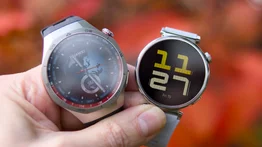Moto 360 Sport review – a smartwatch with GPS tracking

The Moto 360 Sport has the makings of a great fitness watch hybrid, but its design and inaccurate GPS limit its appeal
Specifications
Pedometer: Yes, Heart-rate monitor: Yes (optical), Display size: 1.37in, Resolution: 360×325, OS support: Android 4.3+ or iPhone with iOS 8.2+, Battery life: One day
However, there still aren’t many ways to interact with the data, and its map data is all over the place. The Sport’s GPS tracking is good enough to get the basic gist of where you went, but my route was always full of jerky points and corners, even on relatively straight roads, and half the time it didn’t even register me as being on the road at all, instead veering off into nearby buildings. It is useful not having to carry your phone around with you, but I wish the Sport’s GPS was better.

Display
This is a real shame, as the Moto 360 Sport’s new adaptive 1.37in, 360×325 resolution display is excellent. Instead of using a standard IPS or AMOLED panel, the Moto 360 Sport has what Motorola calls an AnyLight screen. This is a unique type of hybrid display that can automatically adapt to the level of natural light available, reflecting the light when you’re outside but still providing a legible screen when you’re indoors. It works brilliantly in practice, keeping colours bright and crisp regardless of viewing angle.
The screen also has an ‘Always-on’ mode, which turns everything black and white when you’re not looking at it. This is particularly handy when you’re exercising, as it means you don’t have to press the Sport’s crown to turn it on manually, or make a concerted effort to twist your wrist in order to activate its ambient light sensor, which once again makes a return appearance at the bottom of its (almost) circular display. Even better, enabling ‘Always-on’ doesn’t use the Sport’s backlight, so it’s power efficient as well as practical.

Battery Life
However, even this isn’t enough to prevent the Sport’s 300mAh battery from konking out after little more than a day. With the screen brightness set to Auto and ‘Always on’ enabled, I finished the day with around 30% battery life, but when it eats around 20% overnight, you’ll definitely want to leave it charging up overnight before you go out again the next morning.
Turning on GPS for a quick run didn’t seem to impact the battery life hugely, though I didn’t try and run any marathons with it admittedly, we’ll be investigating such battery drain further over the weekend.
Conclusion
The Moto 360 Sport is a competent smartwatch with the makings of a great fitness tracker, but Motorola needs to put a lot more work into its Moto Body app before it can really become a viable alternative to other fitness devices. Powered by a quad-core 1.2GHz Qualcomm Snapdragon 400 processor and 512MB of RAM, the Moto 360 Sport certainly isn’t wanting for speed, but its meagre battery life pales in comparison to Motorola’s regular Moto 360 devices, and its GPS isn’t as accurate as it could be, making it neither a particularly good smartwatch or a desirable alternative to an all-out GPS-enabled fitness tracker. In our eyes, the Garmin Vivosmart HR is still one of the best fitness watch hybrids currently available, but if GPS is important to you, you should consider the Garmin Vivoactive instead.
| Hardware | |
|---|---|
| Pedometer | Yes |
| Heart-rate monitor | Yes (optical) |
| GPS | Yes |
| Waterproof | No |
| Other features | None |
| Display | |
| Display size | 1.37in |
| Resolution | 360×325 |
| Display technology | AnyLight |
| Smartphone connection | |
| OS support | Android 4.3+ or iPhone with iOS 8.2+ |
| Wireless | Bluetooth 4.0, 802.11b/g |
| Battery | |
| Battery size | 300mAh |
| Battery life | One day |
| Buying information | |
| Price including VAT | £219 |
| Warranty | One year RTB |
| Supplier | www.motorola.co.uk |
| Details | www.motorola.co.uk |
| Part code | N/A |









